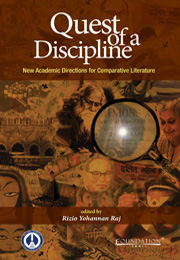Book contents
- Frontmatter
- Contents
- List of Contributors
- Acknowledgements
- Prologue to the “Quest'
- Introduction
- PART I Traditions and Manifestoes: Reflecting on Perspectives
- PART II The Quest Motif: Redefining the Scope of Comparative Literature
- PART III The Dynamics of Exchange: Genres, Areas and Disciplines
- 10 Text and Performance: A Study in Cultural Symbiosis with Special Reference to Kathakali
- 11 The Indian Cartoon Art: A Paradigm for the Emerging Text and Image Experience
- 12 Text and Alter Text: Chinese Literature in Indian Translations
- 13 Arabic Literature in Diaspora: An Example from South Asia
- 14 Literature, Arts and Social Sciences: Interdisciplinary Comparative Advantage
- PART IV India: A Curious Comparative Space
- Afterword: Comparative? Literature?
- Index
14 - Literature, Arts and Social Sciences: Interdisciplinary Comparative Advantage
from PART III - The Dynamics of Exchange: Genres, Areas and Disciplines
Published online by Cambridge University Press: 05 June 2012
- Frontmatter
- Contents
- List of Contributors
- Acknowledgements
- Prologue to the “Quest'
- Introduction
- PART I Traditions and Manifestoes: Reflecting on Perspectives
- PART II The Quest Motif: Redefining the Scope of Comparative Literature
- PART III The Dynamics of Exchange: Genres, Areas and Disciplines
- 10 Text and Performance: A Study in Cultural Symbiosis with Special Reference to Kathakali
- 11 The Indian Cartoon Art: A Paradigm for the Emerging Text and Image Experience
- 12 Text and Alter Text: Chinese Literature in Indian Translations
- 13 Arabic Literature in Diaspora: An Example from South Asia
- 14 Literature, Arts and Social Sciences: Interdisciplinary Comparative Advantage
- PART IV India: A Curious Comparative Space
- Afterword: Comparative? Literature?
- Index
Summary
INTRODUCTION
Studies in literature normally involve two processes, one determined by a centripetal spirit and the other by a centrifugal one. In the first instance, scholars prefer to study literature as an entity in itself, as a single, coherent, self-contained, self-existent art. They choose to study a literary work within the frontiers of a single, self-sufficient national language. Such centripetal approaches not only tend to deny literature its freedom to cross international borders, both artistically and intellectually, but also restrict it from intersecting with other forms of art and knowledge. The second approach to a literary study is powered by a centrifugal spirit. For instance, under the aegis of Comparative Literature, the study of letters has become progressively more interdisciplinary as well as inter-literary. Through this important development in modern scholarship, literature is being restored to its pristine position as a central cognitive resource in society as its most faithful and comprehensive interpreter. It is an art yet more than art, for literature extends outside itself to forms of human experience beyond disciplinary boundaries, making it evident that the rigid separation of disciplines by myopic specialisations can in the long run lead only to counterproductive and paralysing isolation (Barricelli & Gibaldi iv).
Defining Comparative Literature
Henry Remak's definition of Comparative Literature (1961) lent authenticity to an important function of the discipline. He foregrounds the teaching and practice of Comparative Literature in relation to other arts and social sciences.
- Type
- Chapter
- Information
- Quest of a DisciplineNew Academic Directions for Comparative Literature, pp. 213 - 222Publisher: Foundation BooksPrint publication year: 2012

